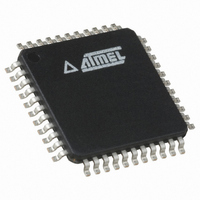ATMEGA32-16AU Atmel, ATMEGA32-16AU Datasheet - Page 34

ATMEGA32-16AU
Manufacturer Part Number
ATMEGA32-16AU
Description
IC AVR MCU 32K 16MHZ 5V 44TQFP
Manufacturer
Atmel
Series
AVR® ATmegar
Specifications of ATMEGA32-16AU
Core Processor
AVR
Core Size
8-Bit
Speed
16MHz
Connectivity
I²C, SPI, UART/USART
Peripherals
Brown-out Detect/Reset, POR, PWM, WDT
Number Of I /o
32
Program Memory Size
32KB (16K x 16)
Program Memory Type
FLASH
Eeprom Size
1K x 8
Ram Size
2K x 8
Voltage - Supply (vcc/vdd)
4.5 V ~ 5.5 V
Data Converters
A/D 8x10b
Oscillator Type
Internal
Operating Temperature
-40°C ~ 85°C
Package / Case
44-TQFP, 44-VQFP
Processor Series
ATMEGA32x
Core
AVR8
Data Bus Width
8 bit
Data Ram Size
2 KB
Interface Type
2-Wire/SPI/USART
Maximum Clock Frequency
16 MHz
Number Of Programmable I/os
32
Number Of Timers
3
Operating Supply Voltage
4.5 V to 5.5 V
Maximum Operating Temperature
+ 85 C
Mounting Style
SMD/SMT
3rd Party Development Tools
EWAVR, EWAVR-BL
Development Tools By Supplier
ATAVRDRAGON, ATSTK500, ATSTK600, ATAVRISP2, ATAVRONEKIT
Minimum Operating Temperature
- 40 C
On-chip Adc
8-ch x 10-bit
Controller Family/series
AVR MEGA
No. Of I/o's
32
Eeprom Memory Size
1KB
Ram Memory Size
2KB
Cpu Speed
16MHz
No. Of Timers
3
Rohs Compliant
Yes
Cpu Family
ATmega
Device Core
AVR
Device Core Size
8b
Frequency (max)
16MHz
Total Internal Ram Size
2KB
# I/os (max)
32
Number Of Timers - General Purpose
3
Operating Supply Voltage (typ)
5V
Operating Supply Voltage (max)
5.5V
Operating Supply Voltage (min)
4.5V
Instruction Set Architecture
RISC
Operating Temp Range
-40C to 85C
Operating Temperature Classification
Industrial
Mounting
Surface Mount
Pin Count
44
Package Type
TQFP
For Use With
ATSTK524 - KIT STARTER ATMEGA32M1/MEGA32C1ATSTK600-TQFP32 - STK600 SOCKET/ADAPTER 32-TQFPATSTK600-TQFP44 - STK600 SOCKET/ADAPTER 44-TQFPATSTK600-DIP40 - STK600 SOCKET/ADAPTER 40-PDIP770-1007 - ISP 4PORT ATMEL AVR MCU SPI/JTAG770-1005 - ISP 4PORT FOR ATMEL AVR MCU JTAG770-1004 - ISP 4PORT FOR ATMEL AVR MCU SPIATAVRDRAGON - KIT DRAGON 32KB FLASH MEM AVRATAVRISP2 - PROGRAMMER AVR IN SYSTEMATJTAGICE2 - AVR ON-CHIP D-BUG SYSTEMATSTK500 - PROGRAMMER AVR STARTER KIT
Lead Free Status / RoHS Status
Lead free / RoHS Compliant
Available stocks
Company
Part Number
Manufacturer
Quantity
Price
Part Number:
ATMEGA32-16AU
Manufacturer:
ATMEL
Quantity:
20 000
Standby Mode
Extended Standby
Mode
Minimizing Power
Consumption
Analog to Digital
Converter
2503Q–AVR–02/11
When the SM2..0 bits are 110 and an external crystal/resonator clock option is selected, the
SLEEP instruction makes the MCU enter Standby mode. This mode is identical to Power-down
with the exception that the Oscillator is kept running. From Standby mode, the device wakes up
in six clock cycles.
When the SM2..0 bits are 111 and an external crystal/resonator clock option is selected, the
SLEEP instruction makes the MCU enter Extended Standby mode. This mode is identical to
Power-save mode with the exception that the Oscillator is kept running. From Extended Standby
mode, the device wakes up in six clock cycles..
Table 14. Active Clock Domains and Wake Up Sources in the Different Sleep Modes
Notes:
There are several issues to consider when trying to minimize the power consumption in an AVR
controlled system. In general, sleep modes should be used as much as possible, and the sleep
mode should be selected so that as few as possible of the device’s functions are operating. All
functions not needed should be disabled. In particular, the following modules may need special
consideration when trying to achieve the lowest possible power consumption.
If enabled, the ADC will be enabled in all sleep modes. To save power, the ADC should be dis-
abled before entering any sleep mode. When the ADC is turned off and on again, the next
conversion will be an extended conversion. Refer to
for details on ADC operation.
Sleep Mode
Idle
ADC Noise
Reduction
Power-down
Power-save
Standby
Extended
Standby
1. External Crystal or resonator selected as clock source.
2. If AS
3. Only INT2 or level interrupt INT1 and INT0.
(1)
(1)
Active Clock domains
2
bit in ASSR is set.
X
X
X
X
X
X
X
(2)
(2)
Oscillators
X
X
X
X
X
X
X
X
(2)
(2)
(2)
(2)
X
X
X
X
X
“Analog to Digital Converter” on page 201
X
(3)
(3)
(3)
(3)
(3)
Wake-up Sources
X
X
X
X
X
X
X
X
X
X
(2)
(2)
ATmega32(L)
X
X
X
X
X
34
















